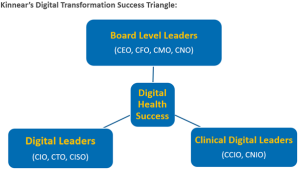Andy Kinnear, Ethical Healthcare’s Partnerships Director, believes that competent and bold digital leadership at executive director level is no longer optional for the NHS.
While digital cannot solve all the challenges facing the NHS, it can change it for the better.
In this rousing article, Andy explains how and why board leaders should embrace the digital agenda.
***
For the last few years, I have included this graphic in many of the talks I have given. I have no empirical evidence to back up its claim. But when I speak to my Chief Information Officer (CIO) colleagues, I observe that those who are buoyant with digital transformation success describe the vision, energy, drive and determination from both their clinical and executive leadership colleagues.

Without doubt, the greatest change in my 30-year career has been the rise of the clinical voice in the digital space. A new profession has been born through this era, and the now commonplace existence of Chief Clinical Information Officers (CCIOs), Chief Nursing Information Officers (CNIOs) and a plethora of other clinical digital leaders, is something of which we can be collectively very proud. It has changed our landscape for the better.
Likewise, the technical leadership space, so long the preserve of the IT enthusiast, is now more often occupied by transformational digital experts motivated by the ways in which technology can transform care by driving efficiency, safety and service. The emergence of the Chief Digital Information Officer (CDIO) role in recent times is further evidence that new thinking is emerging amongst this can-do leadership community.
It is the board, the executive and non-executive layer, that, in my view, still has the greatest distance to travel.
Digital reluctance
It was my frustration in dealing with board directors for whom digital projects were seen as a drain on budgets to be tolerated, rather than transformational opportunities to create a modern NHS, that ultimately led me to quit my full-time CIO seat. I know I am not the only one getting off the bus for the same reason.
I have often pondered what makes some NHS boards so reluctant to go all-in on the digital agenda and have developed three overlapping theories. History plays a big part. In the 1990s, as these directors cut their teeth in NHS management, IT projects were so often associated with failures. A culture set in whereby if you wanted to have a stellar NHS career to ultimately secure an executive role, you were wise to distance yourself from technology projects. In the 2000s, as these folks took on their first senior management roles, the responsibility for digital transformation was largely removed from the frontline as the monster that was the National Programme for IT (NPfIT) took charge. Right at the time our directors should have been honing their digital skills, they were largely removed from the debate as big decisions were taken on their behalf in Leeds or London by the NPfIT junta.
Look at the world though their lens; they have been successful in their careers, achieving executive status in the NHS is no mean feat after all. Add in the fact that their decision-making today is based on the knowledge and experience accumulated to date, and therefore often lacking in digital aspects for the reasons above. Also, their very real need to be credible, inspiring and strong leaders who are naturally reluctant to highlight any gaps in that knowledge, especially when those gaps have not hindered their climb up the ladder so far. Add the pervasive NHS England culture which so often stifles the risk-taking, innovative and adventurous spirit needed to see an alternative digitally powered future. It is no wonder some boards find it hard to drive digital transformation and who can blame them. Remember too, only 20% of trusts have an executive digital director.
Embracing the digital revolution
But anyone reading this blog will know that competent and bold digital leadership at executive director level is no longer optional. The NHS is facing its darkest days ever and, whilst I do not for one minute think we can save it with digital projects alone, I do wholeheartedly believe we can change it for the better with them. The digital revolution in banking, travel, retail, communications and just about every other industry on the planet, has been driven by embracing the opportunity technology presents and relentlessly focusing on the needs of the consumer; the ultimate beneficiary of that change.
These industries have shifted work to their consumer – driving efficiency, improving service, saving costs, reducing workforce burden and improving morale – and the consumer is actually happy about it. When we travel, we do a vast amount of work the travel provider used to do for us and yet we feel more in control. Crikey, when we go to the supermarket many of us choose to work the tills ourselves because it is quicker and easier.
I can only see one way out of this predicament. We find ways to educate, support, develop and grow confidence in the board layer. Open, transparent and compassionate interventions based on mentoring, critical advice, examples of success and, above all, HOPE – an exercise to create true believers, who are able to change the culture around digital programmes and help their organisation and their Integrated Care System (ICS) embrace the digital opportunity.
Get in touch
Our digital board development service can help boards to improve their digital knowledge and confidence – and harness the advantages of digital transformation.
If you would like to discuss how we can develop your board’s digital decision-making skills, please contact Kate Dawes at kate@ethicalhealthcare.org.uk.
